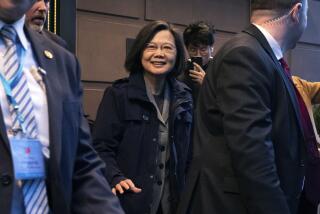Takeshita Pledges to Boost Expenditures for U.S. Defense of Japan
- Share via
TOKYO — Japanese Prime Minister Noboru Takeshita promised Friday to pay more for the U.S. defense of Japan, but downplayed expectations that he might make trade concessions when he visits Washington next week.
“I will not be going to the summit meeting with any preset ideas as to what specific issues I shall discuss with (President Reagan), such as farm trade and public works,” he told foreign reporters.
He said Tokyo had decided to shoulder a greater share of the costs of U.S. military bases in Japan. By 1990, the Foreign Ministry said, Japan is to pay the entire cost of employment benefits enjoyed by Japanese working at the bases. Under its current agreement with the United States, Japan will only pay up to half of such costs--or $160 million--in 1988.
“Our relations with the United States provide the very underpinning of Japan’s foreign policy, so through candid discussions with President Reagan . . . I should like to make Japan-U.S. relations even more unshakable than they are today,” he said.
Takeshita leaves Tuesday for a three-day stay in the United States, his 10th U.S. trip since 1962, but his first as prime minister. He then goes to Canada for talks with Prime Minister Brian Mulroney.
Takeshita’s comments suggested he would offer few specific concessions in Washington to placate critics in Congress who favor protectionist legislation because of Japan’s persistent trade surplus.
The United States has been pressing Japan to import more food and to grant foreign companies more construction contracts.
But farmers and construction companies are two of the main support groups of Japan’s ruling Liberal Democratic Party, making it difficult for Takeshita to grant concessions in those areas, government officials said.
While insisting that the construction market is open to foreign companies, Takeshita said he recognizes that they face difficulties winning contracts.
He said Japan is willing to enter into negotiations with the United States over Japan’s import quotas on beef and citrus, which are due to expire at the end of March. But he said he could not make any promises on the outcome of those talks.
Takeshita’s reluctance to take a stand on disputes like Japan’s ban on U.S. rice imports underlined the contrast between the new prime minister and his outspoken predecessor, Yasuhiro Nakasone.
Takeshita, 63, has pledged to pursue Nakasone’s initiatives, including higher defense spending, stimulating the domestic economy to reduce Japan’s traditional reliance on exports, and measures to further open Japan’s markets to imports.
Also Friday, several thousand dairy farmers marched through downtown Tokyo to protest reported government plans to liberalize imports of agricultural products in response to U.S. pressure.
More than 3,000 people, some with signs saying, “Don’t Kill Farmers,” rallied in Hibiya Park and marched to government offices, a police official said.
Members of the group also went to the U.S. Embassy and met with an official to express their opposition to U.S. pressure on Japan to open its agricultural markets, organizers said. An embassy official said the officer had taken their comments “under advisement.”
More to Read
Sign up for Essential California
The most important California stories and recommendations in your inbox every morning.
You may occasionally receive promotional content from the Los Angeles Times.













